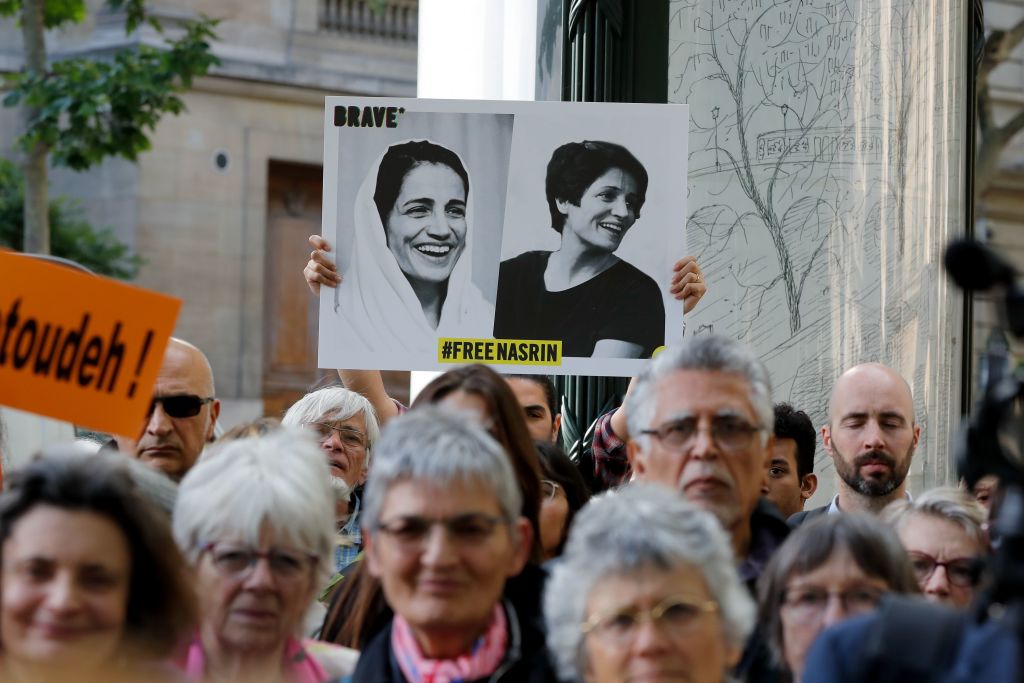
On Sunday, while attending a funeral service for 17-year-old Armita Geravand, renowned Iranian women’s rights attorney Nasrin Sotoudeh was arrested and beaten. A local news agency in Tehran said Sotoudeh’s grounds for arrest were “not wearing a headscarf” and “disturbing the society’s mental security.”
Other Iranian human rights activists, mourners and protesters were arrested alongside Sotoudeh—all of whom had assembled to honor Geravand, who was recently arrested and assaulted by the country’s morality police for not wearing a headscarf. Geravand eventually fell into a coma and died on Saturday, the day before the arrests.
A journalist at the scene (who wishes to remain anonymous) told The Guardian: “I was violently pushed back, and watched as they beat up those holding protest placards. I myself counted at least eight people who were violently beaten and detained. I have no idea where they were taken.”
Reza Khandan, Sotoudeh’s husband, told Agence France-Presse that his wife was “violently beaten” during the arrest, which took place at the Behesht-e-Zahra cemetery in Tehran.
Ms. received this update on Monday morning from Khandan:
“Nasrin refused to wear a hijab when she met with the prosecutor’s office.
“Nasrin called at 2:30 a.m. and said that her glasses were broken in the fight and she asked me to bring her a new pair. I took her the glasses in the morning before she was transferred to the prosecutor’s office, but they did not allow me to give them to her.”
Sotoudeh was first held in Vozara Detention Centre in Tehran, according to sources close to her—the same place Mahsa Amini was taken and eventually died. As of Monday morning, Sotoudeh has been moved to Qarchak women’s prison, known to be one of the worst prisons in the world, where she spent years of her life previously. She has been refused visitors, including from her husband and two children, a close friend of Sotoudeh’s told Ms., who also shared that Sotoudeh is employing the same resistance techniques she used in previous stints in Qarchak: She is on a hunger strike and refusing medications.
“Nasrin is in a dangerous situation due to heart problems and the conditions of Qarchak prison and hunger strike,” said Khandan. “We are worried about her health. Nasrin’s arrest and beating during detention caused her glasses to break. This shows how hard they hit her. But we don’t know how much damage was done to her.”
“Nasrin’s arrest and beating at the funeral of Armita Geravand, along with other family and friends, is yet another outrage by a regime that doesn’t represent the people of Iran and will stop at nothing to hold on to power,” said Jeff Kaufman, who produced, directed and wrote the documentary Nasrin. “For those of us who know and love Nasrin, and for everyone who rightly admires her, this is heartbreaking. All political prisoners in Iran should be freed.”
Background on Nasrin Sotoudeh
Sotoudeh has spent her career fighting for the rights of women and minorities in the Middle East. She’s spent many of the last two decades in prison:
- Arrested in June 2018 because of her work representing opposition activists, religious minorities and women who publicly protested Iran’s mandatory hijab law, Sotoudeh was sentenced to 38 years in prison and 148 lashes, on charges that included “inciting corruption and prostitution,” “disrupting public order,” “propaganda against the state” and “collusion against national security.”
- She had previously been imprisoned from 2010 to 2013 on similar charges—a heavy price to pay for loving one’s country.
For her important work, Sotoudeh has been honored with copious awards and designations, including the U.S. State Department’s Global Human Rights Defender title and Ms. magazine’s Top Feminist award. Just this month, she is the sole recipient of both The Civil Courage Prize, which honors individuals who show courage against evil and oppression, and the Brown Democracy Medal from the McCourtney Institute for Democracy, marking the award’s 10th year.
Shortly before her arrest, Sotoudeh had authored a new book: Women, Life, Freedom: Our Fight for Human Rights and Equality in Iran (translated by Parisa Saranj, foreword by Jeff Kaufman). A free download of the book is available here.
“If the monster of oppression has nested in one corner of the world, it doesn’t mean it won’t get up and move,” wrote Sotoudeh in the book. “No, it has already begun to prowl. The monster is hungry, and it dreams of taking over the world. We must overcome our fears, stand up to the beast, and look it in the eyes.
“I want our children to see and be inspired by great women like my aunt. I don’t want her to live only as a memory, as a dream. That’s why I will try everything I can to give the women of Iran the society they deserve.”
Up next:
U.S. democracy is at a dangerous inflection point—from the demise of abortion rights, to a lack of pay equity and parental leave, to skyrocketing maternal mortality, and attacks on trans health. Left unchecked, these crises will lead to wider gaps in political participation and representation. For 50 years, Ms. has been forging feminist journalism—reporting, rebelling and truth-telling from the front-lines, championing the Equal Rights Amendment, and centering the stories of those most impacted. With all that’s at stake for equality, we are redoubling our commitment for the next 50 years. In turn, we need your help, Support Ms. today with a donation—any amount that is meaningful to you. For as little as $5 each month, you’ll receive the print magazine along with our e-newsletters, action alerts, and invitations to Ms. Studios events and podcasts. We are grateful for your loyalty and ferocity.
This post was originally published on this site be sure to check out more of their content.








